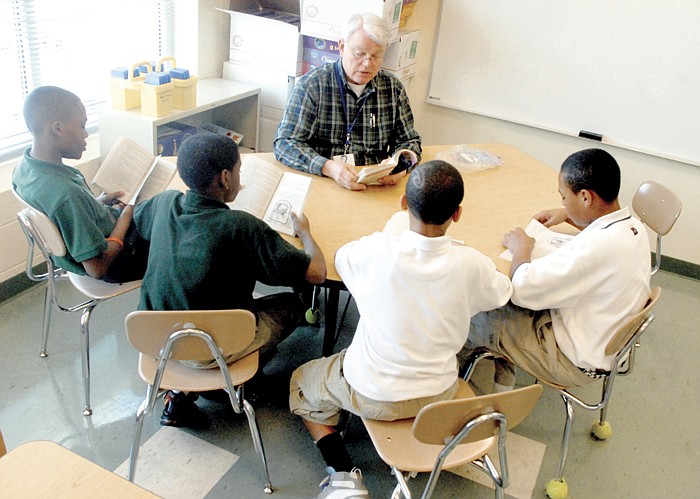Split evenly among all public school students in Tennessee, the state's Race to the Top win Monday comes out to about $540 for each student.
Although students won't benefit equally - money will be doled out based on schools' percentages of poor students - the fact that every district in the state agreed to participate is a big reason why Tennessee was awarded the $500 million for which officials applied, U.S. Secretary of Education Arne Duncan said Monday.
"Tennessee's plan truly is a statewide effort," he said during a teleconference announcing Race to the Top winners.
Tennessee shares the prize only with Delaware, which won about $100 million.
BY THE NUMBERS* $4.35 billion: Total Race to the Top money* About $500 million: Money awarded to Tennessee* About $100 million: Money awarded to Delaware* $12.6 million: Estimate of Hamilton County's cut* About $3.4 billion: Money left for second phase of Race to the TopSource: U.S., Hamilton County departments of educationRACE TO THE TOP WINNERSScores out of 500 points:* Delaware: 454.6* Tennessee: 444.2* Georgia: 433.6* Florida: 431.4* Illinois: 423.8* South Carolina: 423.2* Pennsylvania: 420* Rhode Island: 419* Kentucky: 418.8* Ohio: 418.6* Louisiana: 418.2* North Carolina: 414* Massachusetts: 411.4* Colorado: 409.6* New York: 408.6* Washington, D.C.: 402.4Source: U.S. Department of Education
Hamilton County Superintendent Jim Scales said he believed the depth of student test score data in the Tennessee Value-Added Assessment System also gave the state a "real leg up."
Race to the Top is a federal competition designed to reward states for education reform. The $4.35 billion fund, which is part of President Barack Obama's American Recovery and Reinvestment Act, was announced about a year ago.
After sifting through 40 applications, the U.S. Department of Education narrowed the finalists down to 15 states and the District of Columbia. Tennessee and Delaware were the only two winners in phase one of the competition, but Mr. Duncan encouraged all losing states to reapply by June 1 for phase two.
Mr. Duncan said he would choose between 10 and 15 winners that would receive a portion of the remaining $3.4 billion.
Georgia was one of the 16 finalists, and the first runner-up in phase one of the competition. Although Georgia ranked just below Tennessee, Mr. Duncan said Monday that does not give the state an advantage in phase two.
"Georgia had a very competitive application, but they don't have a leg up for the new competition," Mr. Duncan told the Times Free Press. "They obviously can build on their strong work."
Unlike Tennessee, which had cooperation from all 136 school districts, only 23 of Georgia's 180 school districts - none of them in North Georgia - signed on to participate.
Georgia Association of Educators President Jeff Hubbard said the lack of "front-line" voices hurt the Peach State's chances.
"It is (the association's) opinion that the failure to include the voices of the individuals responsible for improving our schools in Phase 1 hurt Georgia's application," Mr. Hubbard said in a statement. "If Georgia does decide to participate in Phase 2, it is our hope that Gov. Perdue will this time include the voices from the front-line educators."
Dr. Scales said Hamilton County likely would receive about $12.6 million. Among the items the district will spend the money on are:
* Beefing up a $100,000 professional development budget.
* Creating a new model for teacher evaluations.
* Implementing leadership development programs, such as the Principal Leadership Academy.
Hamilton County officials now have 90 days to create a plan for how to use the money, Dr. Scales said.
"Ninety days will pass rapidly. We need all 90," he said. "I'm going to steal from every school system in the world that has a good idea going."
Battle Academy principal Ruth White said her school received the greatest benefit from support staff such as reading interventionists, and she hoped Hamilton County's money would allow for the hiring of such positions.
Tennessee Gov. Phil Bredesen, who said he had "no expectation of actually getting" the $500 million for which the state applied, said it was refreshing for Tennessee finally to not be nearly last in an education ranking.
"At least in this area, which is about the willingness for innovation, the willingness to move forward, we're tied for No. 1," he said.
Staff writer Ben Benton contributed to this story.
Follow Kelli Gauthier on Twitter at twitter.com/gauthierkelli
Continue reading by following these links to related stories:
Griscom: The view after Race to the Top
